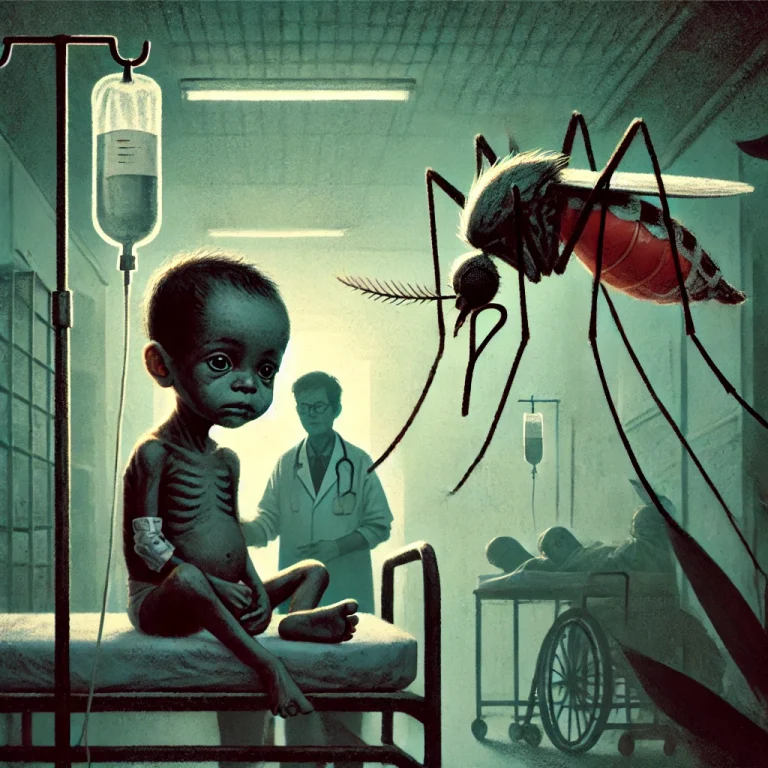In a small hospital ward at the Inpatient Therapeutic Feeding Centre (ITFC) in Unguwa Uku Primary Healthcare Centre, Kano, 26-year-old Zuwaira Muhammad watches over her 10-month-old twins. On her right, Safwan sleeps peacefully; on her left, Safuna receives a life-saving blood transfusion. Like thousands of other children in Kano, Safuna suffers from both severe malnutrition and malaria—a deadly combination plaguing Nigeria’s most vulnerable.
In 2024 alone, over 40,000 children in Kano were treated for malnutrition at Médecins Sans Frontières (MSF)-supported facilities. Worryingly, a significant proportion of them also tested positive for malaria. Between January and May, out of 14,000 children diagnosed with malnutrition, 9,000 were found to have malaria, highlighting the intricate link between the two conditions.
“Malaria can reduce appetite and make it harder for the body to absorb nutrients, leading to malnutrition. Conversely, malnutrition can weaken the immune system, making children more susceptible to infections like malaria,” explained Dr. Yanu Mbuyi, MSF Medical Coordinator in Nigeria.
Malaria remains one of Nigeria’s leading causes of death. The 2024 World Malaria Report by the World Health Organization (WHO) indicates that Nigeria accounts for 26% of global malaria cases. Kano alone contributed approximately 9% of Nigeria’s 68 million malaria cases in 2021, with 30% of hospital admissions linked to malaria.
A rising crisis
The surge in malnutrition cases in Kano paints a grim picture. MSF treated 7,798 children for malnutrition in 2022, a number that jumped to 23,800 in 2023 and doubled to 46,304 in 2024. Alongside this, malaria cases soared, with 36,546 confirmed cases—the highest since MSF began operations in Kano.
“What we had in 2024 was a twin peak of malaria and malnutrition,” said Dr. Hemmed M Lokonge, MSF Project Coordinator in Kano.
To manage the crisis, MSF expanded its operations, opening outpatient treatment centres in Kumbotso and Rijiyar Lemo, complementing the existing facility in Unguwa Uku. At the height of the crisis, the 75-bed inpatient centre in Unguwa Uku became overwhelmed, prompting the urgent establishment of a 90-bed facility at Murtala Mohammed Specialist Hospital—which filled up within just two hours.
Muhammad, who travelled over 40 kilometres from Wudil to access MSF services, expressed relief at her daughter’s progress. “Safuna is feeling better now compared to when I brought her here a few days ago. She was weak and could hardly move, but now she has more energy and can even laugh,” she said.
Urgent need for expanded response
MSF’s work in Kano initially focused on COVID-19 response but has since evolved into a critical lifeline for malnourished children. Currently, it is the only organisation providing inpatient therapeutic feeding in Kano, catering to patients from 37 of the state’s 44 local government areas, as well as from neighbouring states.
In 2024, MSF treated over 357,000 children for malnutrition across northern Nigeria—an increase of 35% from the 265,500 treated in 2023. Among them, 75,000 required inpatient care, while 282,000 received outpatient treatment. Alarmingly, the malnutrition crisis peaked as early as March—months before the usual July spike—and continued through November, raising fears that 2025 could be even worse.
The persistent malnutrition crisis in northern Nigeria is fueled by multiple factors, including inflation, food insecurity, inadequate healthcare, security challenges, and low vaccine coverage. Immediate solutions must involve strengthening healthcare systems, improving food accessibility, expanding vaccination programs, and enhancing community awareness.
Despite MSF’s efforts, its outpatient services only reach three LGAs—Tarauni, Fagge, and Kumbotso—out of Kano’s 44. This limited reach underscores the urgent need for broader intervention. MSF is advocating for the establishment of outpatient feeding centres across all LGAs to enhance community-based management of malnutrition and prevent severe cases.
In 2025, MSF plans to intensify its health promotion activities, empowering families to recognise early signs of malnutrition and take preventive action before hospitalisation becomes necessary.
With the crisis showing no signs of abating, urgent intervention from the government, international organisations, and donors is needed. Without a stronger humanitarian response, Kano—and northwest Nigeria—risks seeing even more preventable child deaths in 2025.


